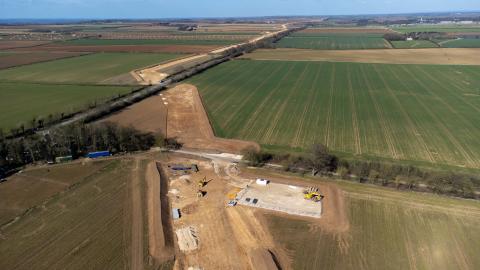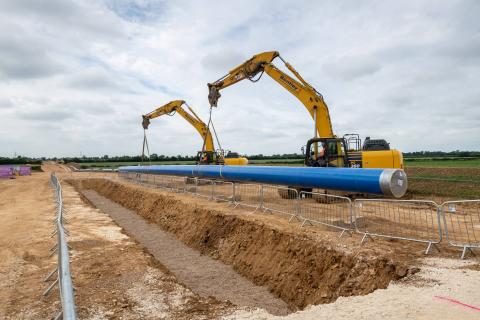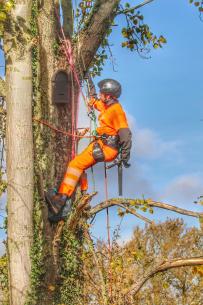Anglian Water Strategic Pipeline Alliance
Building a safer, future-proof water supply for the East of England with Anglian Water
-

Image courtesy of Matthew Power Photography
-

Image courtesy of Matthew Power Photography
Protecting water resources, allowing for climate change and population growth as well as drought resilience for all communities has never been more challenging. It’s even more difficult in the East of England: it’s the most water-scarce area and receives a third less rainfall than the rest of the country. It's also one of the fastest growing, with potential population growth of one million people by 2045.
The new water main network will be capable of transferring 265 million liters (~700 million gallons) of water a day from the wetter north of the Anglian region to the drier south and reduce reliance on damaging aquifer abstraction. This complex challenge demanded a new, creative approach, one that used new ways of working to deliver high-performing infrastructure with a transformative social and economic effect.
The answer to the challenge is the Strategic Pipeline Alliance (SPA), an innovative partnership between Anglian Water, Jacobs and partners (Farrans, Mott MacDonald Bentley and Costain), that’s become the standard-bearer for the sector. Anglian Water is England’s largest water and water recycling company by geographic area with almost 7-million customers. SPA supports Anglian Water’s key strategic aims to make the East of England resilient to the risks of drought and flooding and to be a net-zero carbon business by 2030.
SPA is the biggest drinking water grid program in the U.K. in a generation and one of the largest infrastructure programs in Europe. It relies on diverting water from the wettest areas in the north (Lincolnshire) to the driest areas in the south and the east (including Cambridgeshire, Suffolk, Norfolk and Essex) by building 580 kilometers (~360 miles) of interconnected pipelines.
The interconnector program will play a vital role in safeguarding the environment by reducing reliance on water abstraction from sensitive areas, including chalk streams, to create sustainable water supply for generations.
The project is leaving more than pipes behind, too. SPA has donated more than 2,500 books to primary schools and is proactively working with children on literacy development, planted thousands of trees to boost biodiversity, built special 'commuter' fences to help bats with their navigation and donated life-saving defibrillators to communities.
Unlocking benefits by deliberately delivering differently
Anglian Water’s ethos — “Deliberately Delivering Differently” — aligned perfectly with our reliance on creativity, Project 13 enterprise principles and our new digitally-led methods of working to unlock streamlined, efficient and low-carbon project delivery. The proof of this can be seen in SPA’s large-scale social and economic outcomes. This included taking less water from the environment, lessening the high use of energy to pump water around the region, and strengthening local resilience by reducing the businesses and homes that rely on a single water source. It also helps to drive investment in the East of England — it provides water access for sustainable economic development for a fast-growing population: 175,000 new homes are scheduled to be added by 2026.
SPA’s inaugural scheme first broke ground in June 2021 in Lincolnshire. Once complete, the new network will be longer than the M1 motorway, ensuring more than 600,000 Anglian Water customers receive a safe, reliable water supply for generations. However, this project covers more than just laying pipes: it relies on new ways of working to find the most innovative, affordable and environmentally friendly processes to make this network a reality, and to ensure social and environmental success in all the communities affected.
Driving real-life engagement with virtual events
The pandemic challenged the project at the start, as public stakeholder engagement was due to begin in February 2020 — just before the national lockdown. The regulations stopped public meetings and in-person engagement, but Jacobs’ technology toolbox provided a solution. Virtual Event Space was chosen to share the latest project information with the impacted communities virtually and to gain instant feedback.
The benefits were immediate. It sidestepped program delays, and unlike face-to-face events, it offered around-the-clock access to information, which suited both customers and organizers. Access was opened to more people and was extended far longer as the setup costs were much lower and there were no venue limits.
It offered higher safety levels and COVID-19 compliance, up to 40% in cost savings compared to physical events, and heavily reduced carbon emissions as there was no travel, printed materials or deliveries.
Most importantly, it drove project engagement and approval using features such as the Live Chat function for instant responses. Almost 2,000 people participated in the virtual events, and the local planning authorities supported this revolutionary approach.
Turning pipe dreams into a greener reality with technology
There are several other areas in which we used a combination of technology and talent to create environmental, social and budget-friendly results. Two of the most innovative tech-led processes included a platform-based production system with standard products that were pre-assembled for greater speed and efficiency. We also used digital and physical “rehearsals” to lower risk, save time and effort and improve production.
Here are other examples of award-winning digital technologies used in SPA:
- Sharing faster, secure access to large volumes of geospatial data: Our alliance-wide GIS platform provided secure, consistent and rapid access to data that supported better decision-making on SPA. This innovation earned SPA the prize for Digital Initiative of the Year at the 2021 British Construction Industry Awards for driving the use of digital technologies to improve delivery and create more successful outcomes.
- Harnessing waterless pipe-testing technology for assurance: Our production engineers and assurance teams developed a pipe testing and disinfection methodology (a first for the U.K.) that uses a fraction of the water traditionally need to commission a pipeline of food-grade standard of hygiene.
- Pioneering “pipe-plough” technology for more efficient installation on a number of sections: This ground-breaking approach installs pipes much more accurately and environmentally sustainably by using a special blade that creates precise trenches, cutting out the need for re-filling or digging. This significantly reduces the carbon impact associated with traditional mains-laying.
- Sharing interactive maps to drive customer understanding: Our team used ArcGIS software to create easy-to-use interactive maps for customers to visualize the planned pipeline network better.
- Upgrading service with digital twin technology: The whole project is supported by cutting-edge digital infrastructure to mirror the physical infrastructure. It offers real-time data, superior modeling and scenario prediction, more efficient network monitoring, and, crucially, it drives insights to improve our service for customers.
“As we head into the next five years, which will see us deliver our biggest ever investment programme, our alliancing model continues to be an exemplar in the infrastructure industry, crucial to our success and meeting the demands of a growing population and climate change.”

Driving ecological best practice for all community members
SPA’s environmental remit doesn’t end with ensuring a clean water supply. One of the core commitments from Anglian Water is to protect the region’s diverse wildlife and to consider the construction’s impact. Tailored surveys were created to ensure the pipelines avoided sensitive ecological sites with protected species such as water voles, bats, badgers and Great Crested Newts. However, the work didn’t end there.
Our team used several tactics to help maintain rich, diverse and environmentally friendly landscapes and to protect wildlife. Here are three examples:
1. Using thermal imaging drones at night to safeguard nesting birds.
2. Installing camouflaged fences to help bat navigation.
3. Protecting migrating amphibians with special signage and a partnership with Toadwatch.
Turning on innovation to meet net-zero targets and program delivery
SPA is a crucial factor within Anglian Water’s net-zero by 2030 plans. We identified several carbon reduction opportunities to meet the increased service demand while reducing the carbon footprint.
The overall result: Jacobs played a crucial role in challenging the scope and materials, resulting in the program reducing 65% of capital carbon compared to the baseline set.
This was just one of the crucial outcomes of SPA’s collaborative work and pioneering approach to engineering, sustainable development and project delivery. The second outcome is the sector legacy in elevating safety, raising quality standards, and driving higher productivity due to digital solutions, new ways of working and class-leading innovation.
SPA by the numbers
-
84 M
the reduction in liters of abstraction from aquifer sources
-
600 K
customers protected by the resilient, safe water supply
-
4 ,380
Olympic swimming pools – size of potential water shortfall per year by 2025 without the project












































